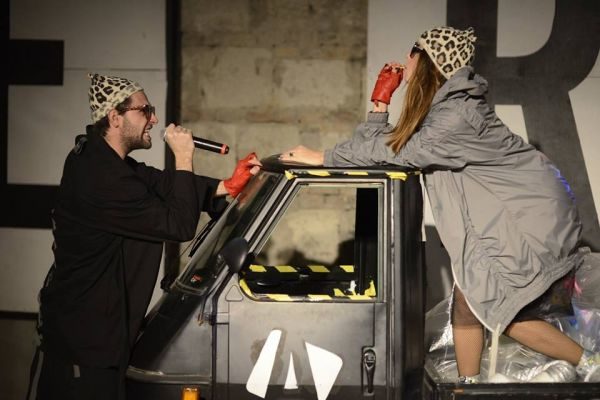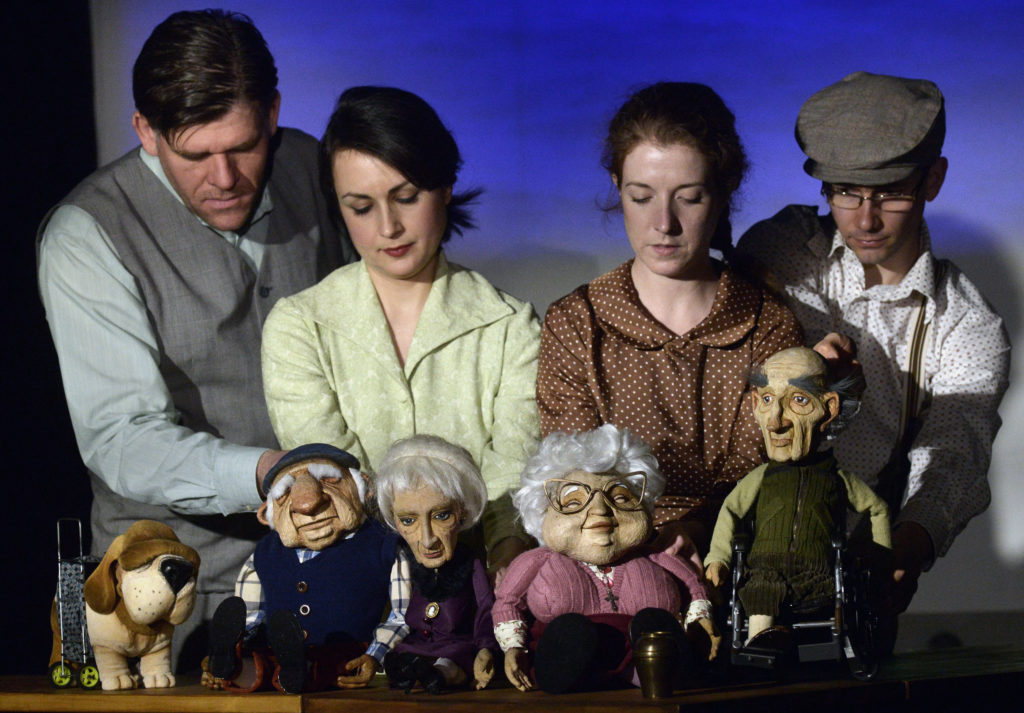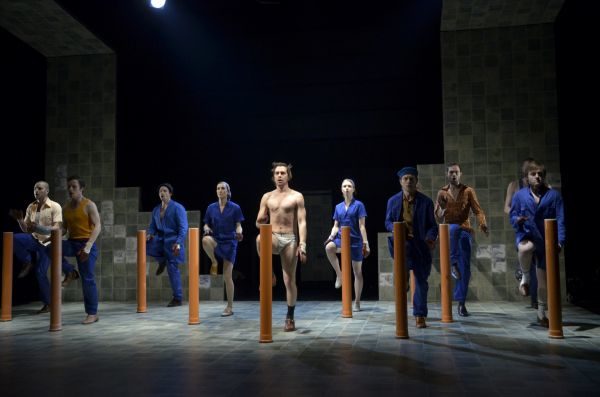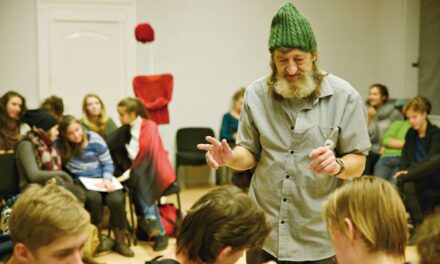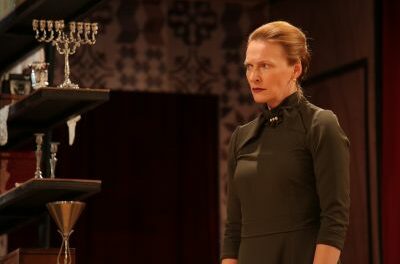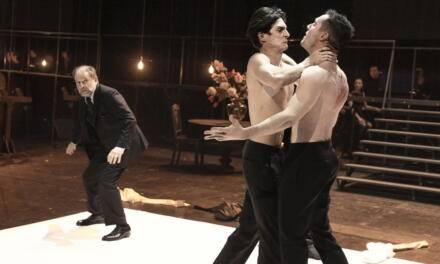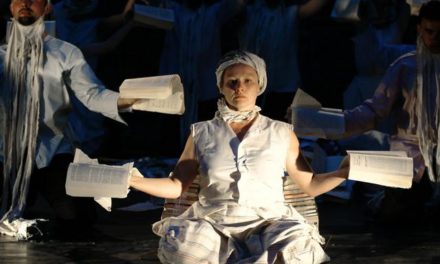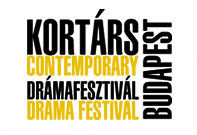 The Kortárs Drámafesztivál (contemporary theatre festival) in Budapest has just celebrated its 13th edition, with two main characteristics: a « showcase » approach, oriented towards foreign professionals (programmers, critics, literary agents…), and a focus on the young generation of Hungarian directors.
The Kortárs Drámafesztivál (contemporary theatre festival) in Budapest has just celebrated its 13th edition, with two main characteristics: a « showcase » approach, oriented towards foreign professionals (programmers, critics, literary agents…), and a focus on the young generation of Hungarian directors.
Supported by the SzínMűHely foundation, the festival started in 1997 as a biennial, before reaching its current annual rhythm in 2007. In a very tense political background, the director of the festival, Mária Mayer-Szilágyi, is trying to hold steady while confronted to drastic changes in the cultural priorities of the new government and the decreasing of public funding: the festival is some sort of sounding board for Hungarian creation, with more and more international angle, especially in the framework of specific programs for the translation of contemporary authors.
Originally created in 2003, Viripaev’s Oxygen is adapted by Bálint Szilágyi, last year student at the university of Theatre and Film in Budapest. Produced by the festival itself, the performance is given in a quite unusual venue: the Anker’t, a trendy bar & club for hipsters opened in a decaying building in the centre of the city (the concept of “romkocsma” or “ruin pub” emerged in Hungary in the early 2000s). Sandor Markus and Angela Eke slam while manipulating a Jesus head printed on a giant inflatable cross, accompanied by a DJ. They echo, in a series of sequences inspired by the Ten biblical Commandments, the moral dilemmas to which the Russian and East-European youth are confronted nowadays.
Not nearly as convincing, One Woman by Béla Paczolay, at the Jurányi (theatre incubator opened in 2012), is based on the testimony of Eva Peterfy-Novak as rendered in her best-seller book published two years ago. The stage adaptation lacks perspective and suffers from an overflow of words somehow stuck in a non-theatrical directing, in spite of the Reka Tenki’s subtle and overall excellent acting. But no doubt that the play can, like Réparer les vivants (“Mend the Living”) in France, be successful in touching an audience willing to get themselves dragged into a more naturalist, psychologizing theatre, closer to current social issues.
At the Katona Jozsef Theatre, a hotspot for contemporary creation (and a rather politically-motivated venue), The Champion by Béla Pintér has been sold out for days. The play, an opera parody for piano solo based on Il Tabarro by Puccini, is a satire of the corruption in local Hungarian political life, with a thwarted triangular love story in the background. It’s an effective project but vocally unstable and a little demagogic overall. A few days later, The Day of Fury, in the same theatre, is the adaptation of a famous local story that happened in early 2015 in Hungary, about protest movements in the hospital environment. Director Árpád Schilling (whose company Krétakör has been roaming across the European stages for the past 10 years) built it as a social tragedy carried out by flawless actors. However the play’s intentions are too obvious at times, a symptom of what Heiner Müller had diagnosed in his time: “When art tries to be too directly political, it loses its subversive qualities.” But one can understand why, in the current complex political context in Hungary, such theatre initiatives can be considered as necessary, whether they succeed or not.
Special mention of two atypical shows: The Short History of Our Time, first, is a piece of puppet theatre, seen on a cold morning at the Trafó cultural centre. Conceived by Karoly Hoffer, its scenario and atmosphere remind us of the novel The Hundred-Year-Old Man Who Climbed Out of the Window and Disappeared by Jonas Jonasson: extravagant, light and very cinematographic. We follow with great pleasure the adventures of those four old Hungarians gone on an unlikely road trip to Venice in order to fulfill their dying friend’s last wish. It is aesthetically retro, but the play cunningly handles the various language registers depicting the clash of generations. Back to the Jurányi for Etiquette, a 100% post-dramatic proposition for two comedians and a voice-over. Across the stage, a long white and rectangular set that looks like a fashion show catwalk; i.e. a world of voyeurism and superficiality where the bi-frontal choice and the headphones given to each spectator allow a game of manipulation, leading the audience to interact through absurd instructions. It’s a witty way to deconstruct our social codes and their impact on our physical behaviors, in some sort of Ionescian representation of the works of anthropologist Edward T. Hall. Although one could regret that it goes nowhere fast, it is still scathing and funny.
Finally, in the main hall of the Trafó, Your Kingdom is a stage adaptation by Tibor Keresztury of Sándor Tar’s books. Tar tells us about the difficulties of the post-Soviet era in Eastern Europe, particularly the misery and alcoholism of the working class. Director and choreographer Csaba Horvath, founder of the Forte company, represents them in a very physical theatre bearing a remarkable visual strength. Thanks to the manipulation of plastic pipes, continuously rebuilt into multifunction accessories, and the injecting of traditional Hungarian a capella tunes as well as pop songs, the troupe moves both meticulously and at a dazzling pace.
Kortárs Drámafesztivál, Budapest, December 2-10, 2016.
This article was originally published in I/O Gazette n°50. Reposted and translated by the author. Read the original article in French.
This post was written by the author in their personal capacity.The opinions expressed in this article are the author’s own and do not reflect the view of The Theatre Times, their staff or collaborators.
This post was written by Mathias Daval.
The views expressed here belong to the author and do not necessarily reflect our views and opinions.

